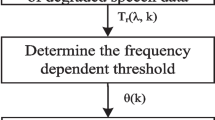Abstract
In this paper we propose an algorithm for estimating noise in highly non-stationary noisy environments, which is a challenging problem in speech enhancement. This method is based on minima-controlled recursive averaging (MCRA) whereby an accurate, robust and efficient noise power spectrum estimation is demonstrated. We propose a two-stage technique to prevent the appearance of musical noise after enhancement. This algorithm filters the noisy speech to achieve a robust signal with minimum distortion in the first stage. Subsequently, it estimates the residual noise using MCRA and removes it with spectral subtraction. The proposed Filtered MCRA (FMCRA) performance is evaluated using objective tests on the Aurora database under various noisy environments. These measures indicate the higher output SNR and lower output residual noise and distortion.
Access this chapter
Tax calculation will be finalised at checkout
Purchases are for personal use only
Preview
Unable to display preview. Download preview PDF.
Similar content being viewed by others
References
Martin, R.: Noise Power Spectral Density Estimation Based on Optimal Smoothing and Minimum Statistics. IEEE Trans. Speech Audio Processing 9(5), 504–512 (2001)
Cohen, I.: Noise Estimation by Minima Controlled Recursive Averaging for Robust Speech Enhancement. IEEE Signal Processing Lett. 9(1), 12–15 (2002)
Sohn, J., Sung, W.: A Voice Activity Detector Employing Soft Decision Based Noise Spectrum Adaptation. In: IEEE ICASSP, pp. 365–368 (1998)
Loizou, P.: Speech Enhancement Theory and Practice, 1st edn. CRC Press, Boca Raton (2007)
Ben Aicha, A., Ben Jebara, S.: Perceptual Musical Noise Reduction using Critical Band Tonality Coefficients. In: INTERSPEECH Conf., Antwerp, Belgium, pp. 822–825 (2007)
Ephraim, Y., Mallah, D.: Speech Enhancement using Optimal Non-Linear Spectral Amplitude Estimation. In: IEEE ICASSP, pp. 1118–1121 (1983)
Rix, A., Beerends, J., Hollier, M., Hekstra, A.: Perceptual Evaluation of Speech Quality (PESQ)- a New Method for Speech Quality Assessment of Telephone Networks and Codecs. In: IEEE ICASSP, pp. 749–752 (2001)
Hirsch, H., Pearce, D.: The Aurora Experimental Framework for the Performance Evaluation of Speech Recognition Systems under Noisy Conditions. In: ISCA ITRW ASR 2000 (2000)
Berouti, M., Schwartz, M., Makhoul, J.: Enhancement of Speech Corrupted by Acoustic Noise. In: IEEE ICASSP, pp. 208–211 (1979)
Cohen, I.: Noise Estimation in Adverse Environments: Improved Minima Controlled Recursive Averaging. IEEE Trans. Speech Audio Processing 11(5), 466–475 (2003)
Author information
Authors and Affiliations
Editor information
Editors and Affiliations
Rights and permissions
Copyright information
© 2009 Springer-Verlag Berlin Heidelberg
About this paper
Cite this paper
Ghourchian, N., Selouani, SA., O’Shaughnessy, D. (2009). Robust Speech Enhancement Using Two-Stage Filtered Minima Controlled Recursive Averaging. In: Ślęzak, D., Pal, S.K., Kang, BH., Gu, J., Kuroda, H., Kim, Th. (eds) Signal Processing, Image Processing and Pattern Recognition. SIP 2009. Communications in Computer and Information Science, vol 61. Springer, Berlin, Heidelberg. https://doi.org/10.1007/978-3-642-10546-3_10
Download citation
DOI: https://doi.org/10.1007/978-3-642-10546-3_10
Publisher Name: Springer, Berlin, Heidelberg
Print ISBN: 978-3-642-10545-6
Online ISBN: 978-3-642-10546-3
eBook Packages: Computer ScienceComputer Science (R0)




